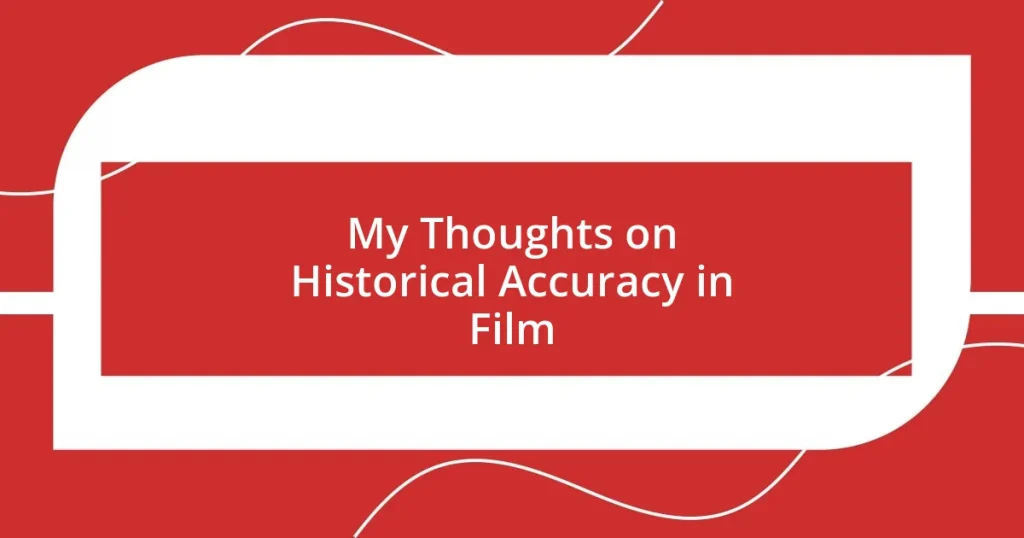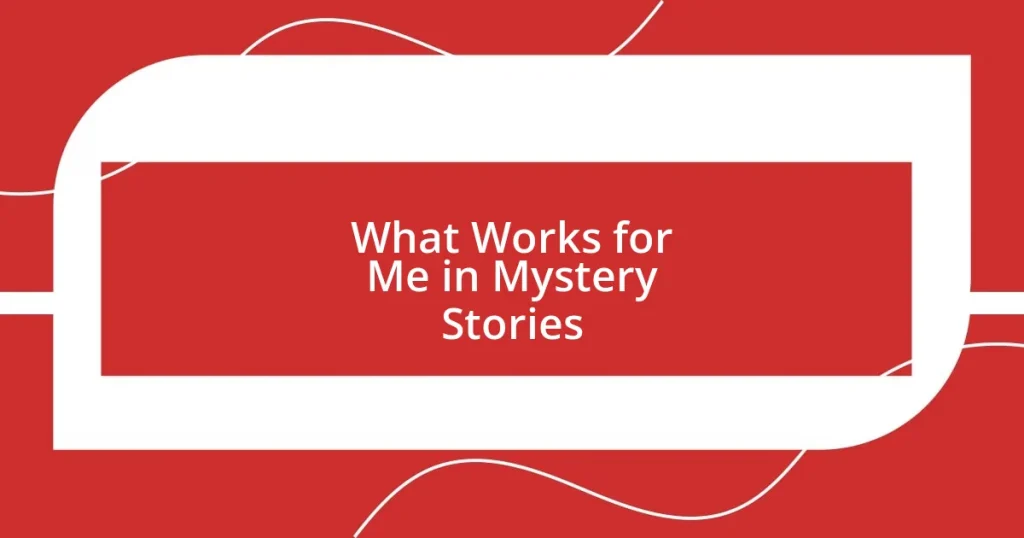Key takeaways:
- Historical accuracy in film impacts public perception and understanding of history, making it crucial for filmmakers to balance storytelling with truth.
- Common inaccuracies include glamorization of battles, misrepresentation of historical figures, and manipulation of timelines, which can distort reality.
- Films can evoke strong emotions that may overshadow factual accuracy, emphasizing the importance of critical engagement from viewers.
- Understanding the research behind films and analyzing character portrayals enhance the ability to discern the truth in cinematic narratives.
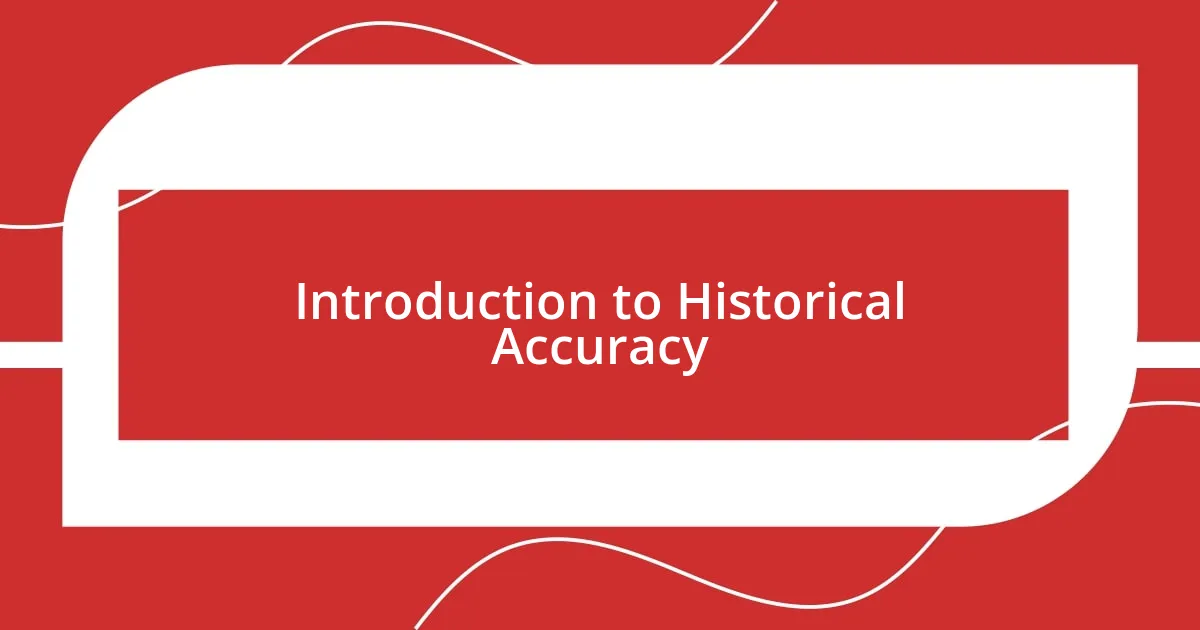
Introduction to Historical Accuracy
Historical accuracy in film is a topic that often sparks lively debates among audiences. I find myself asking, “What really matters more—the story or the truth?” It’s fascinating how a film, while entertaining, can shape our perceptions of historical events, sometimes blurring the lines between fact and fiction.
From my own experiences, I recall watching a film about World War II that left a profound impact on me. As I immersed myself in the story, I couldn’t help but feel a mix of awe and confusion. The emotions conveyed by the characters were so raw and powerful, yet I later discovered that some key events were fictionalized. This left me wondering about the responsibility filmmakers have in depicting histories that affect so many lives.
When I think about the allure of historical dramas, I recognize that they serve both as a medium for storytelling and as a reflection of society’s collective memory. We crave authenticity, yet sometimes it feels like a trade-off for the sake of a compelling narrative. Isn’t it intriguing how a cinematic portrayal can evoke real emotions, even if it strays from the actual events? This intersection of accuracy and creativity is where the discussion truly begins.
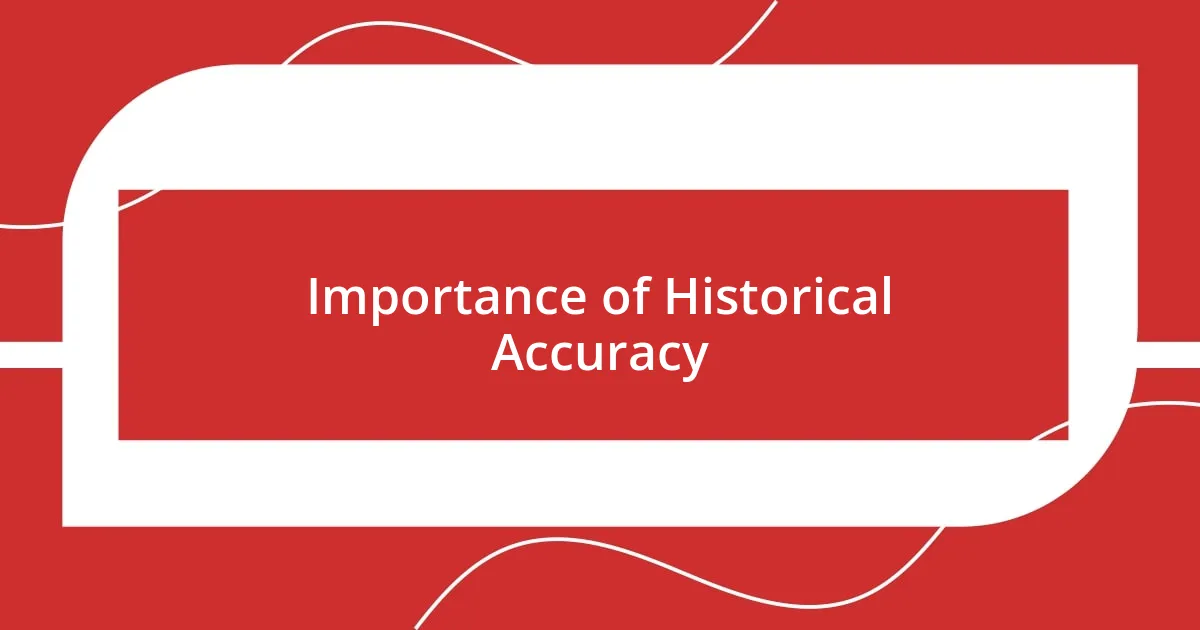
Importance of Historical Accuracy
When I think about the importance of historical accuracy in film, I realize just how much it influences our understanding of the past. A well-researched film can educate viewers, sparking curiosity and inspiring deeper exploration of historical topics. However, when filmmakers take liberties with facts, it can lead to misconceptions that linger long after the credits roll. I once met someone who believed a popular film completely represented the events of a historical figure’s life, only to be surprised when I shared the reality of what actually happened. This moment highlighted for me the significant impact film can have on public knowledge and perception.
Here are some key reasons why historical accuracy matters:
- Educational Value: Films that accurately portray history can serve as learning tools.
- Cultural Identity: Faithful representations can help preserve and honor cultural narratives.
- Emotional Impact: Authentic portrayals lend credibility, enhancing emotional engagement.
- Informed Discussions: Accurate films can promote informed conversations about history.
- Responsibility of Creators: Filmmakers have a duty to balance artistic license with truth.
Ultimately, I think every film has the power to shape minds, and perhaps it’s our role as viewers to discern fact from fiction while holding creators accountable.
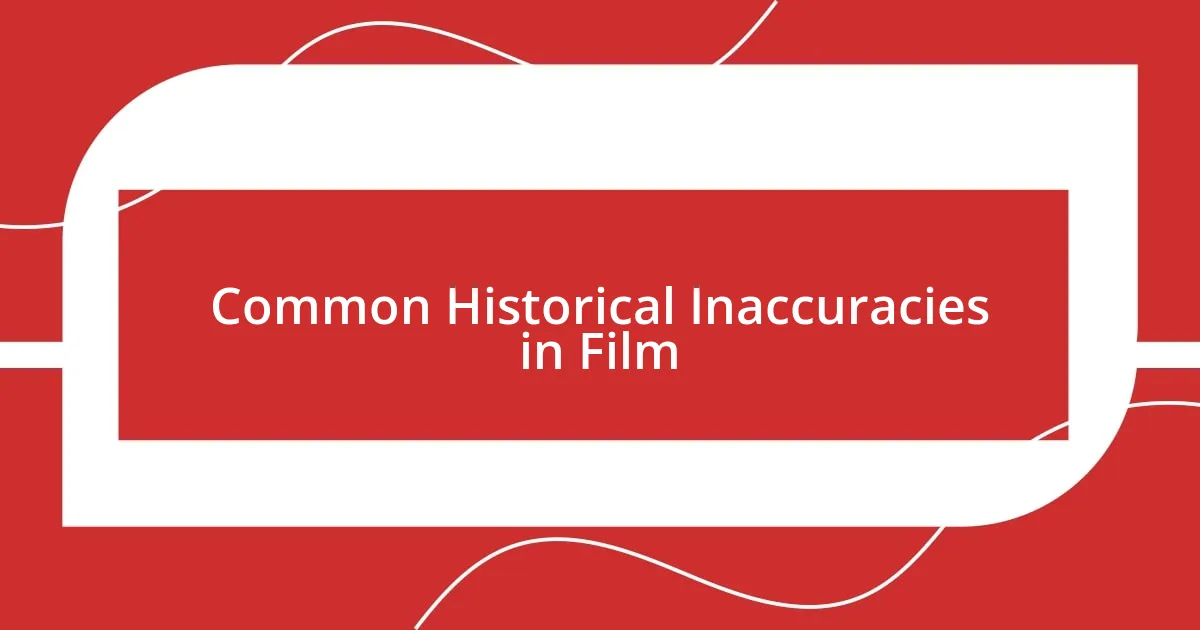
Common Historical Inaccuracies in Film
Films often take creative liberties that lead to significant historical inaccuracies. For instance, I remember watching a movie that depicted a famous battle, showcasing heroic charges that, in reality, were far less glamorous. When I learned that the actual events were much more chaotic and tragic, it made me appreciate the storytelling choices, but also left me feeling a bit cheated. It’s moments like these that remind me how selective storytelling can skew our interpretations.
Another common inaccuracy involves the portrayal of historical figures. I recently saw a film representing a well-known leader as an almost mythical hero. The reality was much more complex, filled with flaws and controversial decisions that were conveniently glossed over. Such portrayals can create a distorted image that misleads audiences about true leaders’ motivations and struggles. This discrepancy makes me wonder what responsibility filmmakers have for crafting complete narratives.
Finally, many films disregard the passage of time, intermingling events that occurred years apart. I think back to films overlaying timelines or merging distinct historical movements into a single narrative. While it can create dramatic tension, it often leads to confusion about the real sequence of events. It poses the question: how much do we sacrifice on the altar of drama that ultimately affects historical understanding?
| Historical Inaccuracy | Example |
|---|---|
| Creative Liberties | Portraying battles with glamorization instead of chaos |
| Misrepresentation of Figures | Depicting leaders as flawless heroes |
| Timeline Manipulation | Intermingling events from different periods |
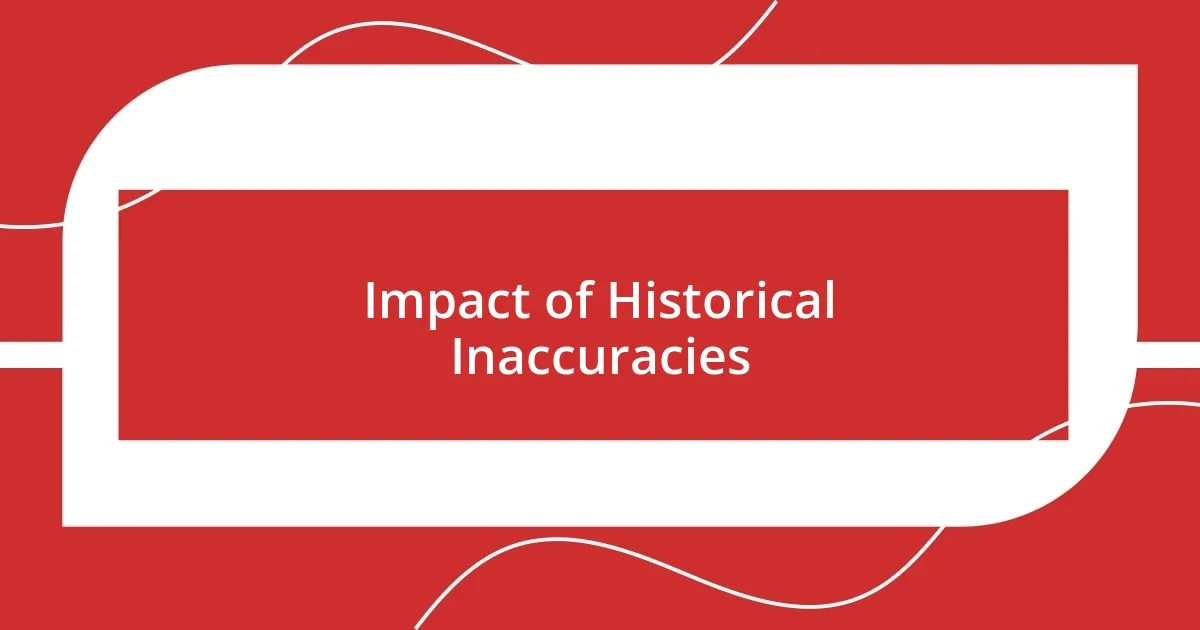
Impact of Historical Inaccuracies
Historical inaccuracies in film can unintentionally shape public perception in profound ways. I recall a time when a friend passionately recounted the events of a large-scale conflict based on a popular film. As we discussed it, I could see confusion in their eyes when I pointed out the stark differences between the film and historical records. This experience underscored how films, while entertaining, can distort reality and lead to a shared understanding that’s fundamentally flawed.
Another aspect that strikes me is how inaccuracies can minimize the voices of those who experienced historical events. I remember feeling frustrated watching a biopic that sidelined the contributions of key figures, replacing them with a more palatable central character. It left me pondering, how many untold stories are swept aside in favor of spectacle? This not only cheapens the narrative but also disrespects the complexities of history and the individuals who lived it.
Moreover, the emotional impact of historical inaccuracies can lead to a false sense of national or cultural pride, which doesn’t reflect reality. I often think back to films that exaggerate accomplishments while ignoring darker truths. It raises an important question: When does the desire for a feel-good narrative dilute the lessons we should learn from our past? Balancing these narratives is a delicate dance, yet vital for fostering a more informed audience.
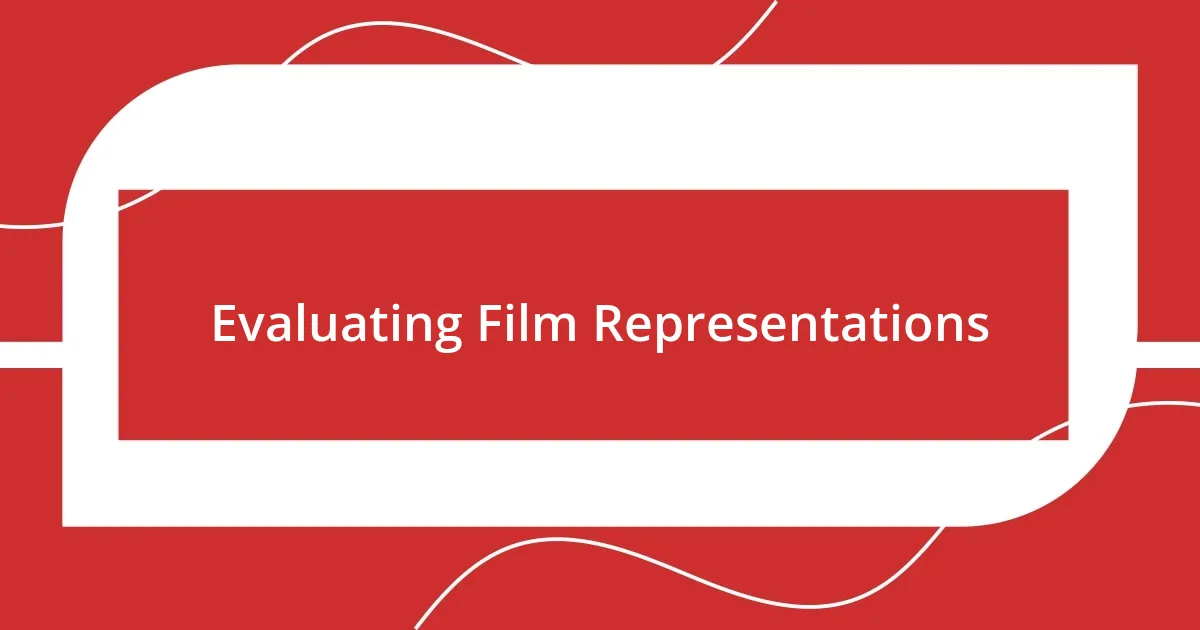
Evaluating Film Representations
When I watch films representing historical events, I find myself constantly evaluating their accuracy. For example, after seeing a critically acclaimed film about World War II, I couldn’t help but think about the soldiers’ grim realities amid the cinematic heroics. It made me consider: how does glorifying these stories impact our understanding of the sacrifices made by real people?
I vividly remember an adaptation of a classic novel that altered key events to fit its narrative arc. The excitement of the plot drew me in, but I soon questioned why filmmakers felt the need to stray so far from the source material. This practice leaves me wondering about the filmmakers’ motivations: is it dramatic tension, or is there an undercurrent of populism that prioritizes entertainment over truth?
There’s something unsettling about how films can shape perspectives on our past. I once encountered a group passionately discussing a historical drama, completely convinced of its representation as fact. It struck me as an unsettling truth: how easily a well-crafted film can overshadow factual history, inviting audiences to accept fiction over reality. Isn’t it crucial for viewers to critically engage with the stories presented to them, distinguishing between artistic license and genuine historical account?

Tips for Analyzing Films Critically
When analyzing films critically, I often suggest focusing on the research behind the story. Recently, I watched a documentary that claimed to tell the complete history of a famous figure. Intrigued, I later dug into scholarly articles that presented a very different narrative. That experience taught me the importance of verifying historical claims against reliable sources.
Another tip I find invaluable is paying attention to the characters’ portrayal and development. I remember watching a film where a historical figure was depicted as a one-dimensional villain, which completely contradicted my understanding from historical literature. This made me think: Are filmmakers sacrificing complexity for the sake of simplicity? It’s essential to look beyond the surface for more nuanced insights into the characters’ motivations and the historical context surrounding them.
Engaging with the emotional tone of a film is also a key element in my analysis. For instance, after watching a film that sentimentalized a tragic event, I felt uneasy about the way it seemed to gloss over the suffering involved. It raised a question for me: Is this emotional manipulation based on truth, or is it a convenient narrative crafted for the audience? Understanding the emotional undercurrents can help us discern the intent behind the storytelling while reminding us to approach each film with a critical eye.
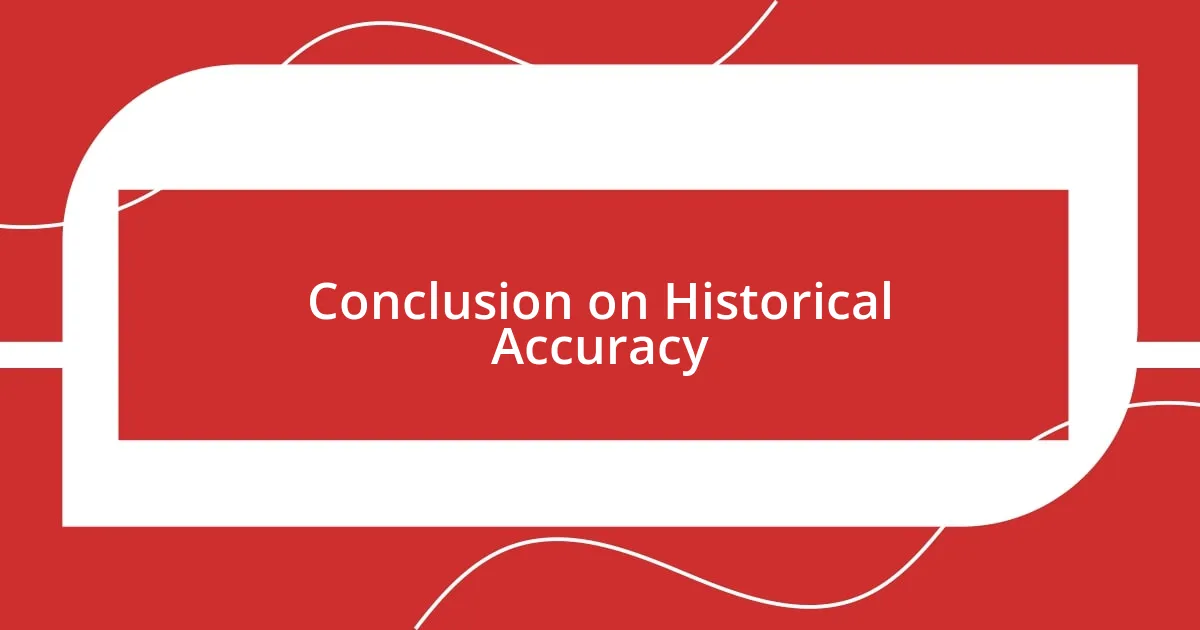
Conclusion on Historical Accuracy
Evaluating historical accuracy in film often leaves me reflecting on the responsibility filmmakers carry. I recall watching a film set during the Civil Rights Movement, where the central character seemed to embody ideals that, while admirable, oversimplified the complexities of the struggle. This portrayal made me ponder: are we doing a disservice to history when we simplify real struggles into inspirational narratives? It’s a delicate balance between storytelling and staying true to the essence of events.
Having engaged with various historical films, I’ve noticed that the emotions they evoke can sometimes overshadow the facts. One film, in particular, had me tearing up during a supposedly pivotal moment, only to later find out that the scene was largely fictionalized. That experience was eye-opening for me; how often do we allow our feelings to cloud our judgment? I believe it’s essential for audiences to remain vigilant, differentiating between genuine sentiment and intentional manipulation in storytelling.
In conclusion, the allure of cinema often tempts filmmakers to prioritize engagement over accuracy. However, I believe it is vital for us as viewers to challenge ourselves to dig deeper and scrutinize the representations we consume. How can we truly appreciate the art of filmmaking while remaining faithful to the real narratives that shape our collective memory? Engaging with history means navigating the fine line between drama and truth—a journey that ultimately enriches our understanding of both.










